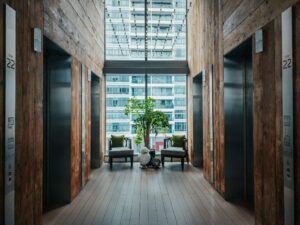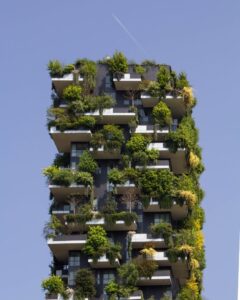Wood and concrete have been used in construction for thousands of years. Both materials have properties that make them appealing building materials.
Today we will cover some of the differences between concrete versus wood-frame construction, which is an important factor to consider when purchasing a condo here in Vancouver.

Advantages and Disadvantages of Wood
Generally, most buildings in Vancouver under six stories will be constructed of wood. Wood-frame is less expensive per square foot, which allows for larger living spaces. Wood frame is faster to build, and some people prefer a low rise building that wood-frame provides.
The biggest disadvantage is simply the noise transfer, even in a brand new building where they pour a few inches of concrete between each floor. It still doesn’t compare to the sound installation that you get from a concrete building.

Advantages and Disadvantages of Concrete
What are the advantages of concrete? Concrete has less noise transfer between floors. Some insurance companies look more favorably at concrete as it can perform better in a major flood. Concrete allows for taller buildings past six stories here in BC. Concrete can have better resale value, particularly in older buildings.
On the flip side, concrete is typically more expensive per square foot and concrete buildings take longer to construct.

Wood Buildings – Sustainability
When we think of wood, we often imagine a natural, sustainable and environmentally friendly building material. And in many ways it is. Wood stores carbon dioxide which results in a reduction of carbon dioxide emissions by 2,432 metric tons equal to taking 500 cars off the road for a year. It is inexpensive, light and easy to work with. A natural resource readily available presenting promising opportunities.
Concrete Buildings – Sustainability
On the other hand, concrete is often criticized for being unsustainable, as it takes a lot of resources to produce. Cement, a main component of concrete, is one of the world’s biggest contributors to greenhouse gas emissions. Many people assume that because cement production is bad for the environment, so is concrete production. But the truth is far more complicated than that.
Concrete is durable. It’s lifespan is actually two or three times longer than other common building materials. Concrete is great at absorbing and retaining heat, which means it will increase energy efficiency of a building and reduce HVAC expenses. It’s reflective properties will decrease air conditioning costs in the hot summer months. Concrete produces little waste as it can be produced in batches specific to project needs.
Wood vs Concrete Buildings – Which is Safer?
So now the question is, which is safer concrete or wood? In general, wooden structures are not as safe as concrete buildings. Wood is vulnerable to external threats like fire, wind, insects and moisture, all of which can result in structural damage and safety risk.
While concrete is a durable, strong material. It too poses some safety risk. For example, if a concrete structure collapsed either at a job site or once the building is occupied, falling concrete could seriously injure anyone who is nearby. Also, if you are a builder working with dry or wet concrete, you may experience irritation of the eyes, nose, throat, or skin. Furthermore, exposure to silica, a main ingredient in dry concrete, can even cause far more serious health issues, including lung cancer.
Should I buy a wood or concrete building?
Buying a unit in a wood or concrete building is ultimately up to you. Both have pros and cons that need to be taken into consideration. You might prioritize concrete if you are concerned about safety. Or you may prefer low rise buildings which are typically constructed with wood. Plus, cost is always an important factor that comes into play.
Talk to your realtor about your wants and needs to help determine the best fit for you. Additionally, an experienced realtor may have knowledge about the developer. This helps you evaluate the building development with the track record of the developer.
Now that you know more about buildings with concrete and wood, which one would you choose?
—
For more information on real estate market in Vancouver, current trends, buying a home or selling a home, contact Leo Wilk – Your Top Vancouver Realtor.
Contact Leo
— Don’t forget to follow Leo Wilk on Facebook | Twitter | Youtube | Instagram
